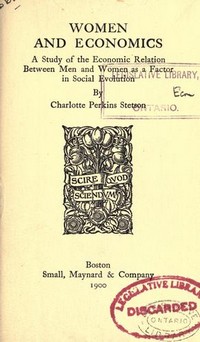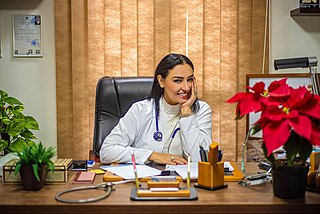
Midwifery is the health science and health profession that deals with pregnancy, childbirth, and the postpartum period, in addition to the sexual and reproductive health of women throughout their lives. In many countries, midwifery is a medical profession. A professional in midwifery is known as a midwife.

Barbara Ehrenreich was an American author and political activist. During the 1980s and early 1990s, she was a prominent figure in the Democratic Socialists of America. She was a widely read and award-winning columnist and essayist and the author of 21 books. Ehrenreich was best known for her 2001 book Nickel and Dimed: On (Not) Getting By in America, a memoir of her three-month experiment surviving on a series of minimum-wage jobs. She was a recipient of a Lannan Literary Award and the Erasmus Prize.
Lorraine Bethel is an African-American lesbian feminist poet and author.

Women and Economics – A Study of the Economic Relation Between Men and Women as a Factor in Social Evolution is a book written by Charlotte Perkins Gilman and published in 1898. It is considered by many to be her single greatest work, and as with much of Gilman's writing, the book touched a few dominant themes: the transformation of marriage, the family, and the home, with her central argument: “the economic independence and specialization of women as essential to the improvement of marriage, motherhood, domestic industry, and racial improvement.”

Barbara T. Christian was an American author and professor of African-American Studies at the University of California, Berkeley. Among several books, and more than 100 published articles, Christian was best known for the 1980 study Black Women Novelists: The Development of a Tradition.
Nicole Hollander is an American cartoonist and writer. Her daily comic strip Sylvia was syndicated to newspapers nationally by Tribune Media Services.

The Feminist Press at CUNY is an American independent nonprofit literary publisher of the City University of New York, based in New York City. It primarily publishes feminist literature that promotes freedom of expression and social justice.

The presence of women in medicine, particularly in the practicing fields of surgery and as physicians, has been traced to the earliest of history. Women have historically had lower participation levels in medical fields compared to men with occupancy rates varying by race, socioeconomic status, and geography.
In the early modern period, from about 1400 to 1775, about 100,000 people were prosecuted for witchcraft in Europe and British America. Between 40,000 and 60,000 were executed, almost all in Europe. The witch-hunts were particularly severe in parts of the Holy Roman Empire. Prosecutions for witchcraft reached a high point from 1560 to 1630, during the Counter-Reformation and the European wars of religion. Among the lower classes, accusations of witchcraft were usually made by neighbors, and women made formal accusations as much as men did. Magical healers or 'cunning folk' were sometimes prosecuted for witchcraft, but seem to have made up a minority of the accused. Roughly 80% of those convicted were women, most of them over the age of 40. In some regions, convicted witches were burnt at the stake, the traditional punishment for religious heresy.

Cerridwen Fallingstar, is an American Wiccan priestess, shamanic witch, and author. Since the late 1970s she has written, taught, and lectured about magic, ritual, and metaphysics, and is considered a leading authority on pagan witchcraft.
Maxine Hammond Dashu, known professionally as Max Dashu, is an American feminist historian, author, and artist. Her areas of expertise include female iconography, mother-right cultures and the origins of patriarchy.
Various feminist interpretations of witch trials in the early modern period have been made and published throughout the nineteenth and twentieth centuries. These interpretations have evolved with popular feminist ideologies, including those of the first-wave, second-wave feminism, and socialist feminist movements.
Rosalyn Baxandall was an American historian of women's activism and feminist activist.

Harriet Newell Austin was an American hydrotherapist, author, and dress-reform advocate. She was the designer of the "American costume," a style of dress meant to promote women's health.
The women's health movementin the United States refers to the aspect of the American feminist movement that works to improve all aspects of women's health and healthcare. It began during the second wave of feminism as a sub-movement of the women's liberation movement. WHM activism involves increasing women's knowledge and control of their own bodies on a variety of subjects, such as fertility control and home remedies, as well as challenging traditional doctor-patient relationships, the medicalization of childbirth, misogyny in the health care system, and ensuring drug safety.

Luciana Percovich is an Italian non-fiction writer, a teacher, a translator and director of a series of books on women's history and spirituality. She was born in Gorizia, Italy in a Mitteleuropean Italian speaking family forced to leave Fiume, Rijeka at the end of World War II, with cultural and geographical roots in Austria and Dalmatia, she spent her childhood and adolescence in Gorizia attending Classical studies. At the age of 18, she went to Milan to complete her education, and there she graduated in 1972. She has been defined as "a traveller between worlds and a weaver of space-time connections for her ability of embracing distant wide horizons with a loving insight".
Whatever I've done, it's been conceived within women's relations, in presence of women's bodies and in the flowing of awakened women's emotions.
Linda Burnham is an American journalist, activist, and leader in women's rights movements, particularly with organizations and projects serving and advocating for women of color.

Amy Scholder is an American literary editor and documentary filmmaker known for publishing works by marginalized and especially LGBTQ writers, artists, musicians, and activists.
Early Modern Europe marked a period of transition within the medical world. Universities for doctors were becoming more common and standardized training was becoming a requirement. During this time, a few universities were beginning to train women as midwives, but rhetoric against women healers was increasing. The literature against women in medicine started in the 13th century, and the Early Modern period gave way to a widespread call for licensing and proper training for midwives, which was largely unavailable.
Susan Cayleff is an American academic and emeritus professor at San Diego State University, having taught there from 1987 to 2020. She was one the inaugural members of the National Women's Studies Association Lesbian Caucus and served on the organization's Coordinating Council between 1977 and 1979. She founded the Women's History Seminar Series at the University of Texas Medical Branch, in Galveston, Texas; the Graduate Women's Scholars of Southern California in 1989; and was a co-founder of the SafeZones program at San Diego State University.










